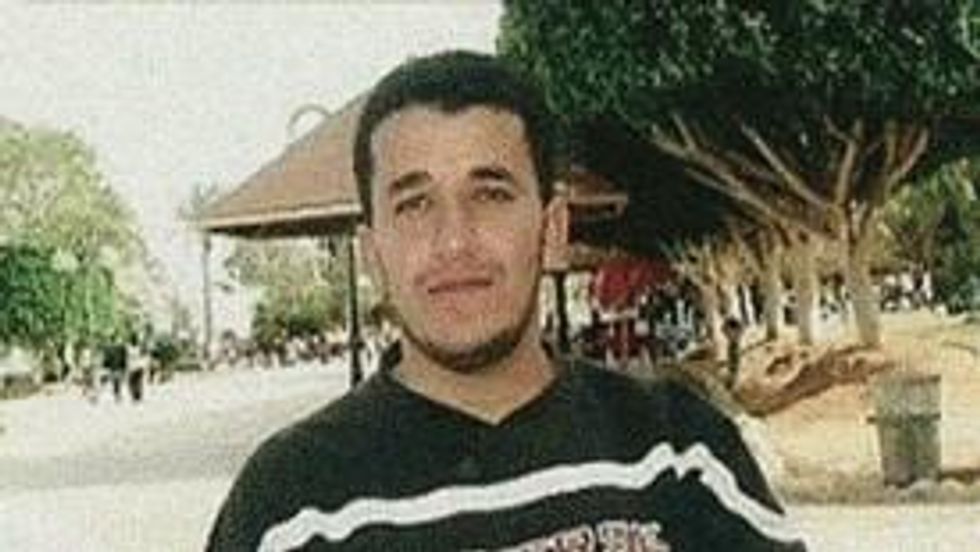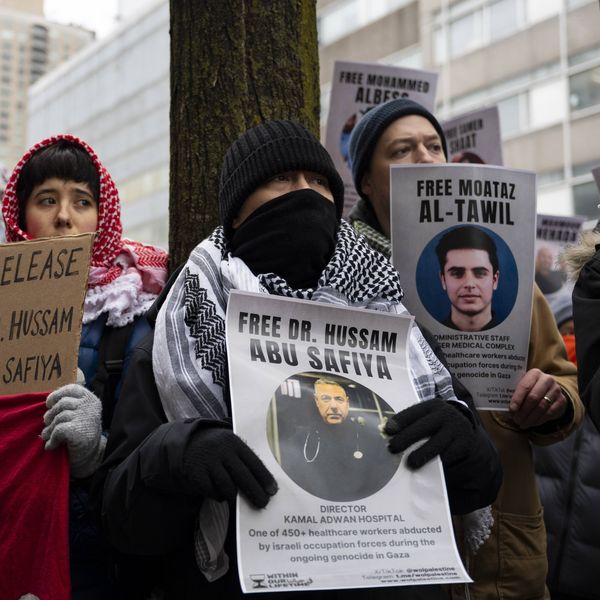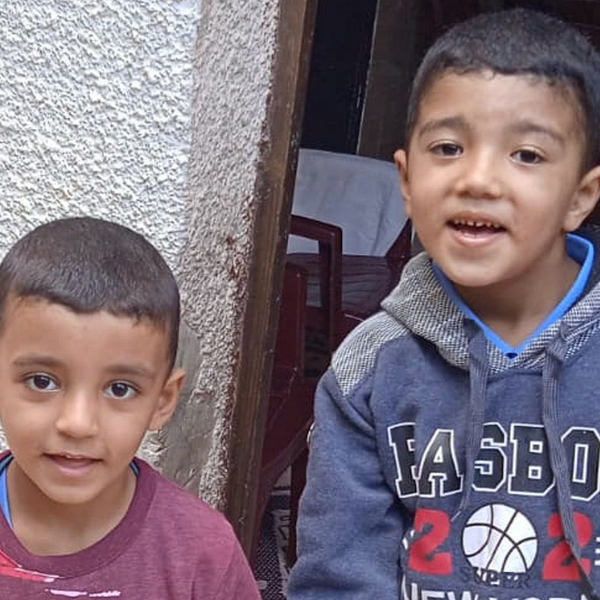Did Arafat Jaradat Die Under Interrogation?
A case of the conflicting autopsies: Palestinian and Israeli.
On Saturday, Palestinian prisoner Arafat Jaradat died from wounds suffered while being held in an Israeli prison. Israeli officials claimed Jaradat died from a heart attack but now say the autopsy evidence is inconclusive. Palestinian officials determined his death was the result of torture.

Described as being in good health by his family and friends, it seems unlikely that 30-year-old Arafat would succumb to a heart attack. An autopsy revealed a slew of bodily injuries incurred during Jaradat's five-day incarceration. These include: six broken bones in the neck, spine, arms, and legs, severe bruising on the back and chest, broken ribs, muscular wounds to the shoulder, chest and right hand, and facial bruising with bleeding from the lips and nose. Jaradat's heart was healthy with no signs of damage.
The UN Security Council and UN Middle East peace envoy, Robert Serry, have called for an "independent and transparent investigation" to establish the cause of death in this case. The inquiry presents a likely catch-22 for these investigating bodies.If the report finds prison authorities complicit in the torture of Jaradat there could be an outbreak of unrest. If authorities are not found responsible Palestinians will likely say the investigation is swayed in Israel's favor, generating significant outcry.
The back-and-forth only deepens the escalating tensions that have come to a head in past weeks. Thousands of prisoners have been participating in widespread hunger strikes to protest Israel's administrative detention policy and bring attention to their plight. The death of Arafat Jaradat only swells the anger and outrage felt by Palestinians that could soon boil over.
The upheaval comes as President Obama is set to visit the region in the coming weeks. Israeli Defense Minister, Amos Gilad, is already claiming that Palestinian medical officials are jumping to conclusions to "stir things up" in advance of the president's visit. But thus far Palestinians have only called for justice and fairness for detained prisoners, to avoid another tragedy like the death of Arafat Jaradat.
An Urgent Message From Our Co-Founder
Dear Common Dreams reader, The U.S. is on a fast track to authoritarianism like nothing I've ever seen. Meanwhile, corporate news outlets are utterly capitulating to Trump, twisting their coverage to avoid drawing his ire while lining up to stuff cash in his pockets. That's why I believe that Common Dreams is doing the best and most consequential reporting that we've ever done. Our small but mighty team is a progressive reporting powerhouse, covering the news every day that the corporate media never will. Our mission has always been simple: To inform. To inspire. And to ignite change for the common good. Now here's the key piece that I want all our readers to understand: None of this would be possible without your financial support. That's not just some fundraising cliche. It's the absolute and literal truth. We don't accept corporate advertising and never will. We don't have a paywall because we don't think people should be blocked from critical news based on their ability to pay. Everything we do is funded by the donations of readers like you. Will you donate now to help power the nonprofit, independent reporting of Common Dreams? Thank you for being a vital member of our community. Together, we can keep independent journalism alive when it’s needed most. - Craig Brown, Co-founder |
On Saturday, Palestinian prisoner Arafat Jaradat died from wounds suffered while being held in an Israeli prison. Israeli officials claimed Jaradat died from a heart attack but now say the autopsy evidence is inconclusive. Palestinian officials determined his death was the result of torture.

Described as being in good health by his family and friends, it seems unlikely that 30-year-old Arafat would succumb to a heart attack. An autopsy revealed a slew of bodily injuries incurred during Jaradat's five-day incarceration. These include: six broken bones in the neck, spine, arms, and legs, severe bruising on the back and chest, broken ribs, muscular wounds to the shoulder, chest and right hand, and facial bruising with bleeding from the lips and nose. Jaradat's heart was healthy with no signs of damage.
The UN Security Council and UN Middle East peace envoy, Robert Serry, have called for an "independent and transparent investigation" to establish the cause of death in this case. The inquiry presents a likely catch-22 for these investigating bodies.If the report finds prison authorities complicit in the torture of Jaradat there could be an outbreak of unrest. If authorities are not found responsible Palestinians will likely say the investigation is swayed in Israel's favor, generating significant outcry.
The back-and-forth only deepens the escalating tensions that have come to a head in past weeks. Thousands of prisoners have been participating in widespread hunger strikes to protest Israel's administrative detention policy and bring attention to their plight. The death of Arafat Jaradat only swells the anger and outrage felt by Palestinians that could soon boil over.
The upheaval comes as President Obama is set to visit the region in the coming weeks. Israeli Defense Minister, Amos Gilad, is already claiming that Palestinian medical officials are jumping to conclusions to "stir things up" in advance of the president's visit. But thus far Palestinians have only called for justice and fairness for detained prisoners, to avoid another tragedy like the death of Arafat Jaradat.
On Saturday, Palestinian prisoner Arafat Jaradat died from wounds suffered while being held in an Israeli prison. Israeli officials claimed Jaradat died from a heart attack but now say the autopsy evidence is inconclusive. Palestinian officials determined his death was the result of torture.

Described as being in good health by his family and friends, it seems unlikely that 30-year-old Arafat would succumb to a heart attack. An autopsy revealed a slew of bodily injuries incurred during Jaradat's five-day incarceration. These include: six broken bones in the neck, spine, arms, and legs, severe bruising on the back and chest, broken ribs, muscular wounds to the shoulder, chest and right hand, and facial bruising with bleeding from the lips and nose. Jaradat's heart was healthy with no signs of damage.
The UN Security Council and UN Middle East peace envoy, Robert Serry, have called for an "independent and transparent investigation" to establish the cause of death in this case. The inquiry presents a likely catch-22 for these investigating bodies.If the report finds prison authorities complicit in the torture of Jaradat there could be an outbreak of unrest. If authorities are not found responsible Palestinians will likely say the investigation is swayed in Israel's favor, generating significant outcry.
The back-and-forth only deepens the escalating tensions that have come to a head in past weeks. Thousands of prisoners have been participating in widespread hunger strikes to protest Israel's administrative detention policy and bring attention to their plight. The death of Arafat Jaradat only swells the anger and outrage felt by Palestinians that could soon boil over.
The upheaval comes as President Obama is set to visit the region in the coming weeks. Israeli Defense Minister, Amos Gilad, is already claiming that Palestinian medical officials are jumping to conclusions to "stir things up" in advance of the president's visit. But thus far Palestinians have only called for justice and fairness for detained prisoners, to avoid another tragedy like the death of Arafat Jaradat.

